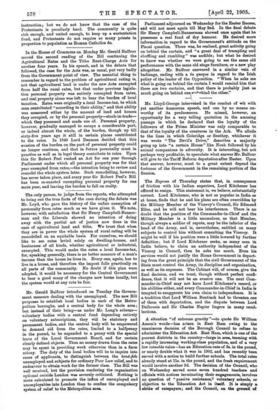The Express of Thursday states that, in consequence of friction
with his Indian superiors, Lord Kitchener has offered to resign. This statement is, we believe, substantially correct. Lord Kitchener, who is not as popular in India as at home, finds that be and his plans are often overridden by the Military Member of the Viceroy's Council, Sir Edmond Elles, and he will not bear his interference. There is no doubt that the position of the Commander-in-Chief and the Military Member is a little anomalous, as that Member, though always a soldier of repute, may be the inferior of the head of the Army, and is, nevertheless, entitled on many subjects to control him without consulting the Viceroy. It might be well if his position were a little lowered by further definition; but if Lord Kitchener seeks, as many men in India believe, to claim an authority independent of the Viceroy in Council, then he asks too much. Even his services would not justify the Home Government in depart- ing from the great principle that the civil Government of the State must control the Army, its discipline and organisation, as well as its expenses. The Cabinet will, of course, give the final decision, and we trust, though without perfect confi- dence, that it will not be an evasive one. The next Com- mander-in-Chief may not have Lord Kitchener's record, or his abilities either, and every Commander-in-Chief in India fs tempted to exaggerate his own claim to independence. It is a tradition that Lord William Bentinck had to threaten one of them with deportation, and the dispute between Lord Dalhousie and Sir Charles Napier lingers in many recol- lections.


































 Previous page
Previous page